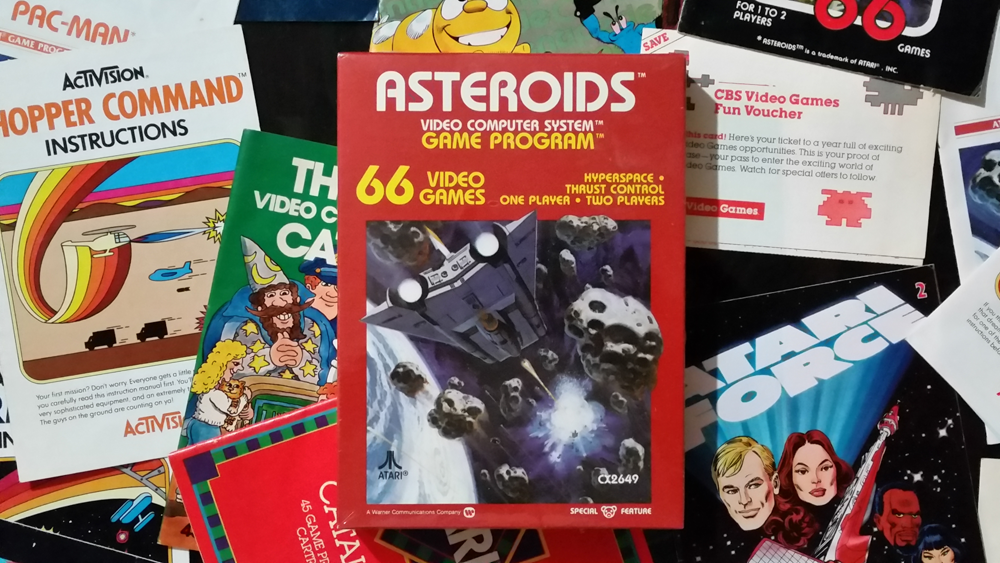As I listlessly skimmed my email’s inbox, I was suddenly slapped awake by an interesting subject line, “Atari reviving Asteroids.”
I loved the sound of that idea. The original Asteroids’ concept of destroying space boulders, while fighting inertia, would be a great starting point for a modern shoot-em-up title.
As I dug into the email, however, it became clear that my assumptions were off … by, like, a lot. Atari is rebooting the series with Asteroids: Outpost, but as an, “open-world, sandbox-style survival experience.”
That doesn’t sound like the Asteroids I know. It probably doesn’t sound like the Asteroids you know, either.
To help me wrap my head around developer Salty Games’ concept, Atari producer and Asteroids: Outpost’s executive producer Peter Banks came to my aid.
GamesBeat: I was a bit shocked by the Asteroids: Outpost announcement earlier this week. When someone mentioned an Asteroids reboot, I did not expect it to be described as an “open-world, sandbox-style survival experience.” What prompted taking the gameplay in this direction?
Peter Banks: Like many of Atari’s great [intellectual properties], Asteroids has a long and storied history. Since 1981, we’ve seen the title appear across a number of different platforms. With the legacy of official versions and clones out in the world, you could almost call Asteroids a genre unto itself.
That said, our goal with Asteroids: Outpost is really to expand the world of Asteroids beyond a single gameplay mechanic and explore the wider context of the game. While we certainly intend to appeal to longtime fans of the franchise, we also want to open up the game to newcomers and those used to more modern gameplay conventions.
GamesBeat: Is the original Asteroids concept somewhere in Asteroids: Outpost’s gameplay?
Banks: Absolutely. The game is set on a massive asteroid, in our solar system’s asteroid belt, and part of the game is defending yourself and your base against deadly asteroid showers.
Tied to this, a core gameplay mechanic is the construction and control of anti-asteroid defense systems to protect your outpost. This mechanic evokes classic gameplay without specifically reproducing it and fits comfortably within the larger context of the overall gameplay.
GamesBeat: Most of the classic Atari franchises we know and love come from a time when video games were extremely young. Games like Asteroids were groundbreaking for their time, but man, they were also extremely basic and bare bones. They are to video games what the silent era is to film. How do you approach the challenge of creating a modern take on these simple game concepts?
Banks: A very good point, and this is something that’s an essential component of our greenlight process.
Some of these titles have really compelling gameplay mechanics we want to focus on. Others present rich or well-loved settings we feel can be explored. In the case of Asteroids – the core concepts are a satisfying destruction of asteroids and an evocative, deep space setting. We love the challenge this kind of process presents us – it gives us a blank canvas to create something really compelling while at the same time providing us with this rich vein of history in which to inspire us.
GamesBeat: Why is Atari going Early Access with Asteroids: Outpost?
Banks: Early Access is an important part of a strategy that focuses on a long-term engagement with our players.
As a multiplayer-focused game, much of the core gameplay [in Outpost] will center on emergent user behaviors. While we do extensive concepting, design, and testing before even reaching Early Access, we’ve really found with our own games, as well as in the games we love to play, [that] the gameplay elements that players really end up enjoying are often ones that they themselves have a hand in crafting. Early Access gives players and our developers a great way to tinker and improve on the core gameplay we’ve created for Asteroids: Outpost.
GamesBeat: Do you see Early Access, and even some forms of crowdfunding, as potentially risky from a development standpoint? It seems like the incentive for finishing a game — as in gaining a player base and selling a product — is gained before reaching completion under these systems. Doesn’t that kill some of the drive to see a project through to the end?
Banks: Developing and publishing games is an inherently risky endeavor – it’s a volatile market with high stakes. That said, the expectation for multiplayer today is that games will be supported over time with regular updates, new content, [and so on].
In the case of Asteroids, we are extremely excited to have a wealth of data from Early Access to further enhance and refine the gameplay for Asteroids: Outpost and continue rolling out content. Basically, it’s the first step in a long-term commitment to a player-focused development strategy.
GamesBeat: There is something strange going on with recent Atari releases. I thought it was just Alone in the Dark: Illumination, but I noticed Haunted House: Cryptic Graves, Minimum, and Asteroids: Outpost are doing the same thing: They are all PC-only releases. What’s going on here? These all seem like they should be major cross-platform, cross-console projects for Atari.
Banks: Atari has a long history of success in the PC market. Digital distribution has been a huge part of our strategy for years, so this in itself is nothing new. We’re still relatively early in this console cycle, and the current install base only supports a fairly finite number of titles. For now, PC really fits our strategy, it allows us to be a bit more experimental and reactive.
GamesBeat: Is there anything else you can tell us about Asteroids: Outpost beyond this week’s announcement?
Banks: We’re just getting started! We’ll have tons more to share in the coming weeks and months as we head into Early Access and beyond!
VentureBeat's mission is to be a digital town square for technical decision-makers to gain knowledge about transformative enterprise technology and transact. Learn More




